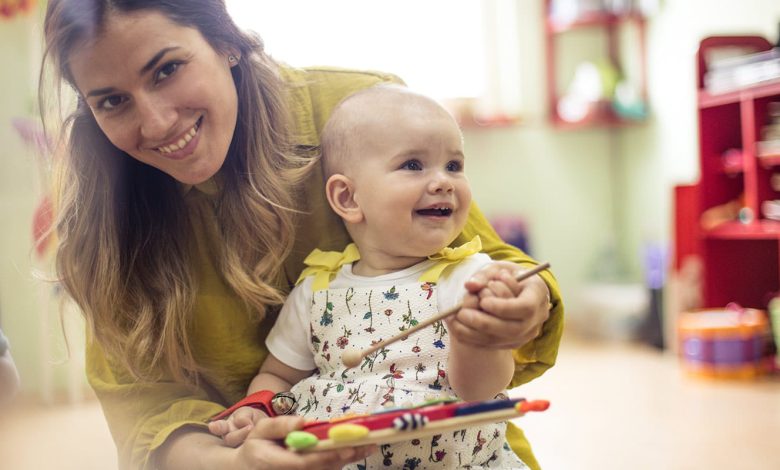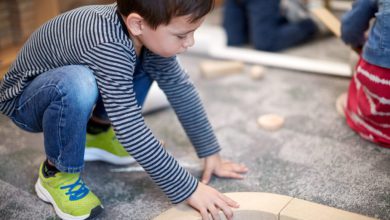Reggio Emilia and the Infant Daycare Classroom

Reggio Emilia and the Infant Daycare Classroom
A quality infant daycare is one of the best ways to promote baby’s healthy learning and development.
Researchers have found links between infant care and life outcomes all the way into high school and even up to age 30!
At Little Sunshine’s Playhouse & Preschool®, our curriculum is founded upon the world-renowned Reggio Emilia approach to early education. We understand children are competent and active learners, even from infancy. Babies have the right to caring teachers and a positive early learning environment.
Let’s take a look at how the Reggio Emilia approach guides our infant daycare program at Little Sunshine’s Playhouse®.
Relationships in Research
The best infant daycare teachers are great listeners, according to Terry Jo Swim, PhD, Associate Dean and Education Professor at Purdue University Fort Wayne.
That’s because all babies have unique personalities, even in the first few months! Some are vivacious and babble frequently, while others like to observe quietly before trying new activities. Effective teachers know how to respond to baby’s individual interaction style.
At Little Sunshine’s Playhouse®, we emphasize relationships to ensure your baby receives the positive interactions he or she needs.
- A low staff-to-child ratio means plenty of time for bonding with a primary caregiver.
- A predictable routine promotes a sense of stability. Feedings, naps, reading and other activities take place at same time every day.
- Teachers hold babies during feedings, rock them to show love and speak to them frequently. This makes baby feel secure and promotes language and social development.
- Babies have access to a variety of engaging materials. They get to experience lots of fun colors, sizes, shapes, textures and sounds. Diverse books introduce a wide range of new words to baby’s ears.
Environment as the Third Teacher
Parents and teachers are every child’s first teachers.
Your baby’s physical surroundings also play a vital role in healthy development. In other words, the environment is the child’s third teacher! A quality infant daycare classroom is thoughtfully designed to engage all of baby’s senses in a positive way:
- Babies thrive in a soothing sensory environment. Classrooms feature soft colors, appropriate lighting that isn’t too bright and a balance between “noisy” and “quiet” activities. Rooms are kept free of clutter.
- We provide many different “no-right-answer” activities to encourage creativity and imagination. Learning centers offer open-ended toys like blocks, balls and baby-friendly furniture that’s easy for crawlers and early walkers to use.
- Above all, Little Sunshine’s Playhouse® prioritizes health and safety through handwashing, classroom cleanliness and close supervision of all activities.
Emergent Curriculum and Documentation
The Reggio Emilia philosophy recognizes that infants are active participants in the learning process. The teacher serves as a guide, partner, nurturer and researcher.
- Flexibility is very important in working with infants! Some babies pick up new skills quickly, while others need a little more practice before getting the hang of it. Good teachers allow enough time for each child to develop at their own pace.
- Babies need the opportunity to make independent choices. A good example is offering a variety of materials and letting the child decide which one to play with. The teacher offers gentle support by describing the selected object as baby interacts with it:
“Oh, you chose the bright red rubber ball instead of the soft green one! Looks how it rolls around when you push it. Look how it bounces when we drop it on the ground!”
- Little Sunshine’s Playhouse® also provides plenty of safe space for baby to explore.
- For the youngest infants, tummy time supports physical development while baby examines a variety of novel objects provided by the teacher.
- For those ready to crawl or walk, lots of child-directed activity allows baby to discover his or her own interests.
- Teachers observe closely and document which activities appeal to individual infants.
- Teachers introduce new skills when each baby is ready. These might include holding a fork or scribbling on a piece of paper with crayons.
The Reggio Emilia approach also holds that teachers and infants learn together. Our teachers keep detailed records of baby’s progress and interests. Regular reports enable us to refine the curriculum, improve teaching methods and provide excellent care for all infants in our program.
Parent Involvement
Reggio-inspired programs understand that parents play an essential role in every child’s learning process.
- Little Sunshine’s Playhouse® strongly encourages parent involvement and welcomes questions, comments and input on baby’s individual needs.
- We track every child’s development using age-appropriate benchmarks that are grounded in up-to-date research on early childhood development.
- Parents receive regular updates on their child’s progress. Sometimes baby achieves new milestones while at school. At other times your child may encounter challenges not noticed at home. We work together with parents to address all important issues as a team.
Are you looking for a high-quality infant daycare program for your baby? Visit a Little Sunshine’s Playhouse® location near you today!
White Paper: The Stages of Early Brain Development
Additional Blog Posts:
Quality Is Key When Choosing an Infant Care Center for Your Baby
The Importance of Nap Time for Kids’ Early Development
The Importance of Early Childhood Education





